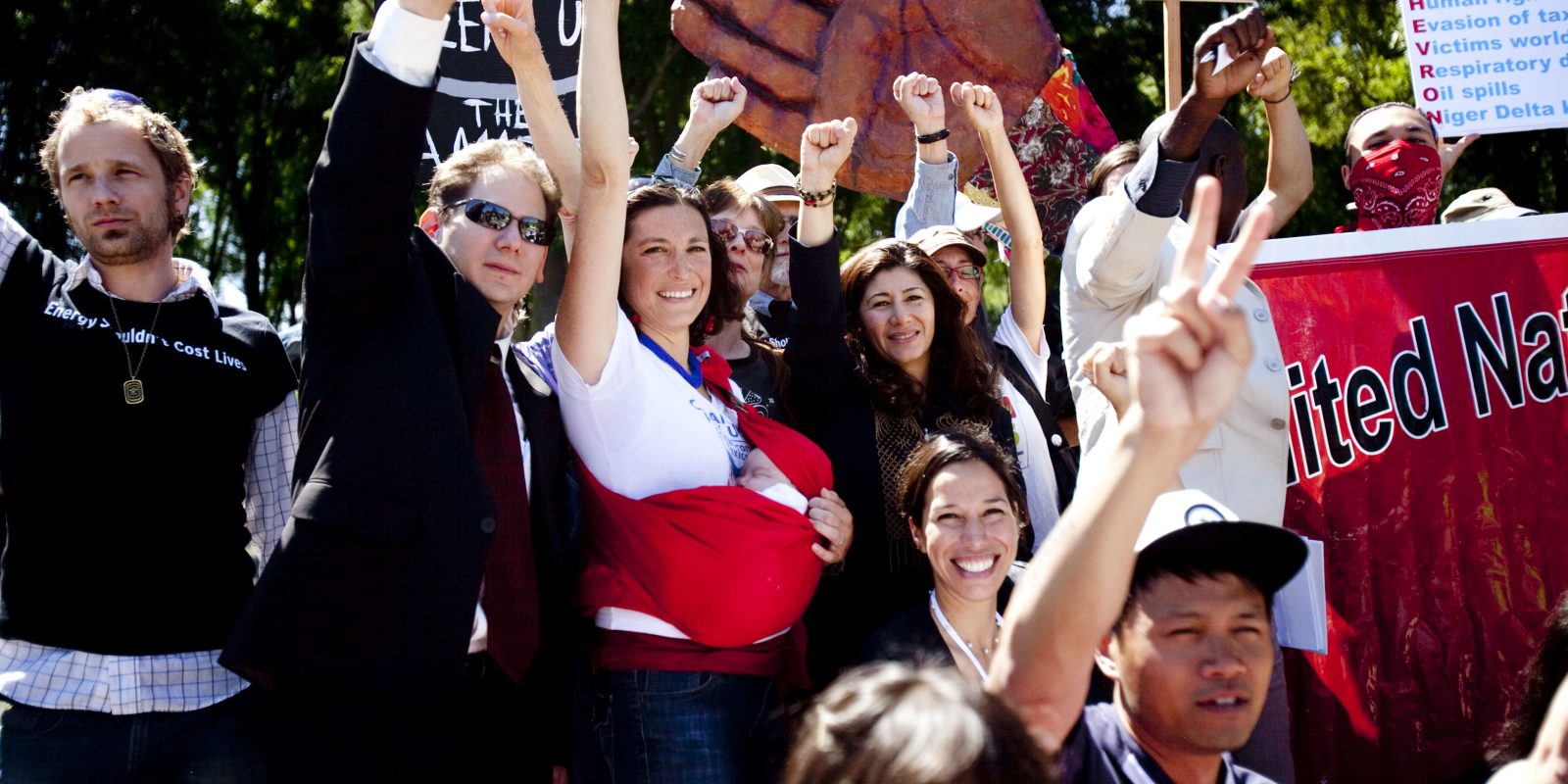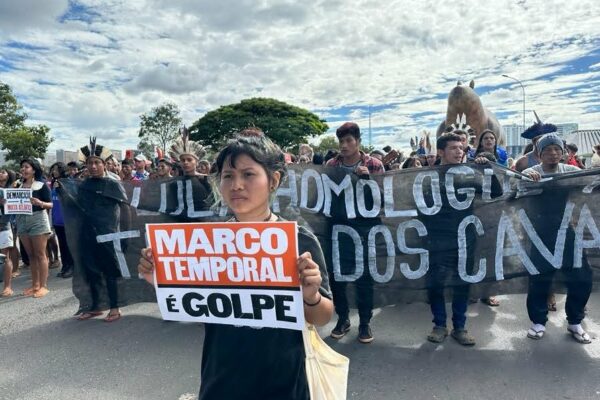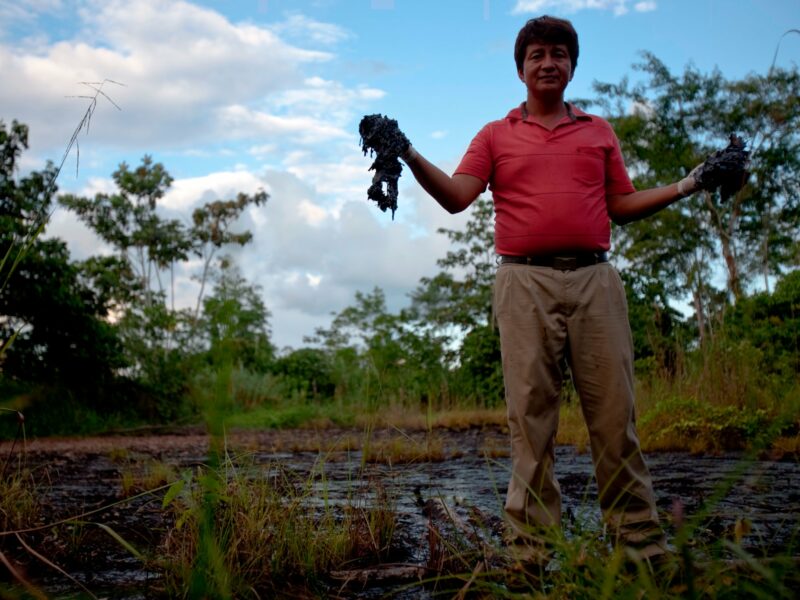At a time when so many black Americans, Indigenous peoples, people of color, and white allies are protesting at systemic racism, we’d like to highlight a different story of marginalized people speaking truth to power on behalf of their most basic human rights. It’s the story of how “big oil” is now using Harvey Weinstein-like destroy-the-accuser tactics to try to crush environmental defenders. It is also the story of how we can all help those defenders peacefully fight back.
In 2001, Chevron acquired Texaco, including all of its assets and civil liabilities. One of those liabilities was the “Amazon Chernobyl,” a 1,700-square-mile environmental disaster in Ecuador that Texaco created through a disregard – and an attitude that local Indigenous groups have called racism – for the health of the region’s peoples. Texaco, the sole operator of the fields from 1964 to 1992, eventually admitted that it deliberately discharged 72 billion liters of toxic water into the environment, which ended up in the water supply, and gouged 1,000 unlined waste pits out of the jungle floor. According to several Indigenous witnesses, including Humberto Piaguaje, a leader of the Ecuadorian Secoya people, the company actually claimed that the oil wastes were medicinal and “full of vitamins.”
Studies have shown thousands of excess cases of cancer deaths and other health problems in the region.
Chevron insists that Texaco is only responsible for a portion of the damage, has “already cleaned up its share” and attributes any remaining pollution to Ecuador’s state-owned national oil company. The government of Ecuador has been clear, in turn, that Chevron is liable for all of the damage.
Originally, Texaco attempted to walk away with impunity, but a coalition of Indigenous peoples and local communities sued Texaco in New York, where the company was based. They got support from a small group of American and Ecuadorian human rights lawyers. The eventual leader of the legal team was Steven Donziger, an attorney we’ve come to know and respect.
Somehow, David beat Goliath. After 18 years of court battles, the coalition won $9.5 billion in damages, based largely on the results of 54 independent judicial site inspections. In all, more than a dozen judges in Ecuador (where Chevron insisted the trial be held) have validated the judgment. In addition, three appellate courts in Canada (where Ecuadorians launched a collective action), including the country’s supreme court, have ruled the Ecuadorians have a right to try to enforce their judgment.
But Goliath won’t pay up. In the words of one Chevron official: “We will fight this until hell freezes over, and then fight it out on the ice.” The company is now in the midst of an estimated $2 billion campaign against Donziger and other environmental defenders, which includes – in the words of an internal memo – a strategy to “demonize” Donziger. The heart of this was filing a civil RICO case in 2011 in New York against Donziger and all 47 Ecuadorian villagers who signed the lawsuit, claiming the case was a “racketeering conspiracy.”
With 60 law firms and 2,000 legal professionals on its payroll, Chevron then succeeded in steering the case to a judge seen as having a notoriously pro-business outlook, Lewis A Kaplan. Kaplan ruled that Donziger and two Ecuadorian community leaders had approved a bribe to the trial judge in Ecuador. But this ruling was horribly flawed as it was based on the testimony of one person. This man later admitted, under oath, to have lied to Kaplan and claimed that Chevron’s lawyers had met him on 53 occasions before he took the stand. Kaplan has nonetheless stated that he “would have reached precisely the same result in this case even without” the man’s testimony.
And although in 2018 an international arbitration panel in The Hague ruled against the award of damages made by the Ecuadorian courts, the procedure excluded the affected Ecuadorian people, was criticized by advocacy groups such as Public Citizen, and was rejected by the government of Ecuador.
Donziger, along with judges and lawyers around the world, continues to challenge Kaplan’s findings. Meanwhile, Donziger faces a Kafkaesque nightmare. Because he appealed a virtually unprecedented order by Kaplan that he turn over his computer and mobile phone to Chevron in the middle of the litigation, Kaplan charged him, with no warning, with criminal contempt of court, imposed millions of dollars of fines and put him under house arrest. Donziger has now been confined to his apartment for the past year, despite the fact that the charge carries a maximum penalty of six months’ detention.
Donziger’s defenders, including top human rights lawyers and Nobel laureates, see Kaplan’s actions as an egregious case of judicial misconduct. In fact, two retired federal judges published a stern rebuke on 13 July. It’s extremely rare for any federal judge, even a retired one, to go public with criticisms of a sitting judge. That same week representatives of the European parliament wrote to several members of the US Congress asking them to investigate the matter. Most recently, more than 200 lawyers from the International Association of Democratic Lawyers filed a judicial complaint against Kaplan for the “abusive targeting” of Donziger, alleging “a series of shocking violations of the judicial code of conduct.”
After talking to Donziger extensively and studying the case, we wholeheartedly agree that he has been treated desperately unjustly throughout this saga. We all worry that use of the RICO statute, a law that was designed to target the Mafia, is now being weaponized by corporations to intimidate Indigenous activists and the lawyers who dare to represent them. And there are now concerns that these same tactics will be deployed in the US against Black Lives Matter organizers and activists.
If governments, including ours in the US, won’t punish Chevron for its lack of respect for the judgments of the supreme courts of other nations, we can. If you’re as offended by Chevron’s actions as we are, please vote with your wheels and boycott the company. Take your business elsewhere and then tweet about why; it could make a difference at a time when Chevron is getting pummeled by the crash in the oil market. Let’s force the Chevron CEO, Mike Wirth, to take responsibility for his company’s behavior, and to cease all attacks on Donziger and others like him.
We shouldn’t allow Chevron’s army of lawyers or Kaplan to poison the well in the US, as was done in Ecuador. This is exactly the type of citizen action we need right now to achieve a more just society.














